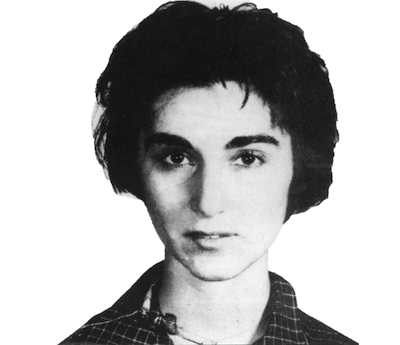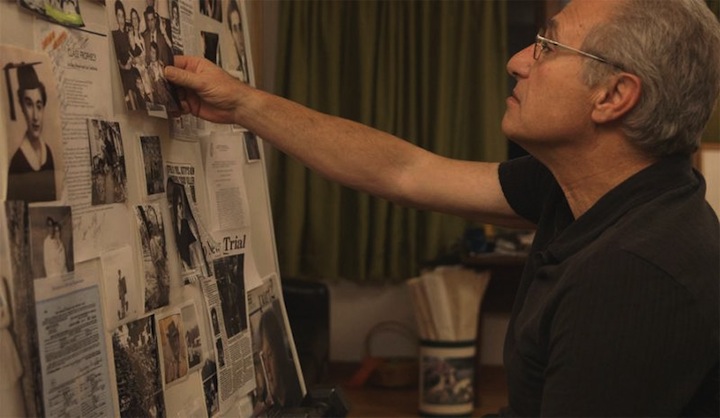
KItty Genovese.
THE WITNESS (2016); DIR. James D. Solomon; Documentary; Atlanta Film Festival; Website here. ATLRetro’s Festival Guide here.
By Andrew Kemp
Contributing Writer
If you saw a person in need of emergency help, what would you do? Most of us would probably say we’d call 911, but would we really? Those trained in first aid know that the best strategy in an emergency is not to scream for somebody to call for an ambulance, but to choose a specific person and tell them to make the call. Otherwise, maybe nobody calls at all.
You may or may not know the name Kitty Genovese, but you’re certainly familiar with the cultural impact caused by her 1964 death in New York City. Genovese, a 28-year-old bar manager, was murdered on the street, half a block from her home, randomly chosen by a man in the midst of a crime spree. Two weeks after her murder, the New York Times published an article detailing the unsettling circumstances of her death. It’s quite possible that Genovese’s life could have been saved, the story goes, if only the 38 witnesses who watched the attack had bothered to call the police. Although her screams ripped through the neighborhood, although she begged for aid, no help came because no help was called. The tragedy became an example of the ways that New York City—and perhaps even America itself—had lost touch with its values of community and compassion. How could Kitty Genovese bleed to death while her neighbors watched? How could so many witnesses produce no action? The case was a major impetus in the creation and marketing of 911 as a national emergency number, and became a centerpiece of a sociological theory of the “bystander effect,” in which the larger the group of people, the less likely any individual is to act in an emergency, due in part to the belief that surely somebody else will be the one.
The story is so well known, in fact, that one might be forgiven for wondering what, exactly, remains to be explored. THE WITNESS, a new documentary that screened Wednesday at the Atlanta Film Festival, spends its first section failing to make this case for itself. The film introduces Bill Genovese (younger brother to Kitty, and an executive producer on the film) who, after struggling with five decades of emotional trauma, finally decides to track down the 38 witnesses and ask them why they let his sister die. There’s a hint of redundancy around his quest. The news show 20/20 tried the same in the 1970s with poor results, and many of the witnesses, elderly even at the time, have long since passed. If this was all the film had up its sleeve, there would seem to be little reason for it to exist at all. But, as it turns out, THE WITNESS has many, many cards to play.

Bill Genovese in THE WITNESS. Used with permission.
Very soon after Bill Genovese begins his quixotic quest, inconsistencies appear. With the sight lines from the apartment building, it wouldn’t be possible for all 38 people to watch Kitty die. Some would have only heard her scream and seen nothing. Only five witnesses were called at trial, so who are the other 33? And what of the woman who raced to Kitty’s side and held her as she died? Why was she absent from the official news story? As the discrepancies pile up, Bill Genovese begins to question the canon, which is no small transition. Genovese, you see, enlisted in Vietnam in the years following his sister’s death, and suffered catastrophic injury, primarily because he refused to be like those people who ignored Kitty, the “silent witnesses” who let tragedy unfold without acting. Was it possible that his choice, and the trajectory of his life, had been based on a lie?
THE WITNESS is an engrossing exploration of the repercussions of trauma. Bill Genovese suffered not only the loss of his sister, but of his own future, and he’s not the only one. Through the careful reveal of information, the film probes how the official story shook the Genovese family, the supposed witnesses, and even the family the murderer, Winston Moseley (who coincidentally died this week in prison, putting the case back into the news), left behind on his way into prison. An astonishing meeting late in the film reveals the fear that the Moseleys have lived with for five decades and reminds us that murders often have more victims than we expect.
 The center of the film, however, remains Bill Genovese, who narrates and drives the action as he pieces together the truth, which is not so simple a thing as the ‘facts.’ He doesn’t only want to know what happened, but why, and even how. Confined to a wheelchair due to his war injuries, Genovese is a nonetheless imposing figure as he confronts reporters, lawyers, and even the aging witnesses in an attempt to set the record straight in his mind. (He has a journalist’s tenacity, often asking witnesses if they ever spoke to the police, and then regardless of their answer, revealing that he has their police statement right in front of him.) He is the witness of the film’s title, not present at the event itself, but willing to stand for his sister, to shine light on her vibrant and rich existence (and, in a particularly moving section of the film, her secrets) to reclaim her from the cold register of history and return her, in some way, to life.
The center of the film, however, remains Bill Genovese, who narrates and drives the action as he pieces together the truth, which is not so simple a thing as the ‘facts.’ He doesn’t only want to know what happened, but why, and even how. Confined to a wheelchair due to his war injuries, Genovese is a nonetheless imposing figure as he confronts reporters, lawyers, and even the aging witnesses in an attempt to set the record straight in his mind. (He has a journalist’s tenacity, often asking witnesses if they ever spoke to the police, and then regardless of their answer, revealing that he has their police statement right in front of him.) He is the witness of the film’s title, not present at the event itself, but willing to stand for his sister, to shine light on her vibrant and rich existence (and, in a particularly moving section of the film, her secrets) to reclaim her from the cold register of history and return her, in some way, to life.
If there is a complaint to be found, it’s in the final minutes, in which the filmmakers execute a macabre event that fails to do much more than provide a punchy ending for their film. But this is ultimately a minor complaint in what remains a compelling and complex exploration of the ramifications of “facts.” The Genovese family cannot bring Kitty back, but perhaps it is enough to remind the world that we are not so alone as we thought.
THE WITNESS opens in theaters in New York later this year before rolling out to additional cities. Further information can be found at https://www.thewitness-film.com/ and the filmmakers’ twitter account is @thewitnessfilm.
Andrew Kemp is a screenwriter and game designer who started talking about movies in 1984 and got stuck that way. He can be seen around town wherever there are movies, cheap beer and little else.
